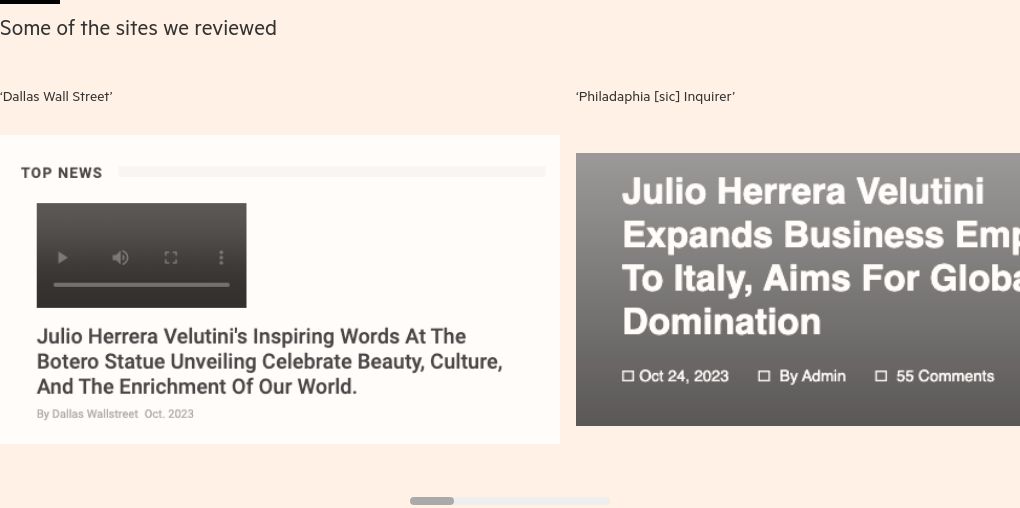
There are two competing versions of Julio Herrera Velutini.
In one, Herrera Velutini — who hails from a storied Venezuelan-Italian banking dynasty — is an anti-corruption crusader and, as website British Bugle puts it, an “Icon of Conservative Capitalism, Traditional Private Banking Principles and Unprecedented Influence Over Latin America and Europe”.
As the Bugle goes on to say:
Politically, Julio Herrera Velutini occupies a unique position. Without ever holding public office, he wields significant political influence.
His connections span from presidents to prime ministers, from the left to the right of the political spectrum. Julio’s influence is often a matter of public debate, given his ability to sway policy decisions, his role in shaping economic policies, and his support for Latin America’s entry into the world markets.
In the other, Herrera Velutini — best known in the UK for donating more than £500,000 to the Conservatives through his London-based business, which also sponsored the Queen’s platinum jubilee Pageant — is a man in trouble with the law.
“‘Who in the world am I?’ Ah, that’s the great puzzle!”
In August 2022, US authorities arrested Herrera Velutini on bribery charges, alleging that he had provided illegal campaign contributions to Wanda Vázquez Garced, then governor of Puerto Rico. In return, the Department of Justice claims, the banker wanted her help to quash a probe into his Puerto Rico-based lender Bancredito, which was being investigated by the local financial regulator.
Garced denies the allegations, as does Herrera Velutini — who says they are “baseless, politically motivated and denied in full”. Schillings, one of the law firms representing him, makes the obvious point that an indictment is merely an allegation and all defendants are presumed innocent until proven guilty.
(The episode drew attention in the UK when it emerged that Herrera Velutini had hired Mark Fullbrook — one of the co-founders of political consultancy CT Group, who was later appointed as Liz Truss’ chief of staff — to carry out opinion research for Garced’s campaign. Fullbrook is not accused of any wrongdoing.)
Herrera Velutini’s trouble didn’t end with his arrest. The US Financial Crimes Enforcement Network (FinCEN) fined Bancredito $15mn last September for processing millions of dollars in suspicious transactions on behalf of high-risk customers and failing to adequately report them as such. Herrera Velutini also disputes these allegations. Bancredito’s holding company has filed a lawsuit alleging the firm’s receiver, Driven LLC, had breached its fiduciary duties to the bank including because it agreed to making admissions to FinCEN that were “factually incorrect and unsupported by the evidence”. Driven strenuously denies these allegations.
Search engines results are the frontline in the battle for reputations. And most Google users don’t look further than the first page, so what’s on top matters.
Herrera Velutini has had a friendly web presence for many years — notably the low-key JulioMHerreravelutini.com, which for a time was registered to a reputation management company and his London-based business Britannia Financial Group. But since the indictment, there has been an apparent surge in transparently supportive content across an array of new websites.
As a result, these contrasting narratives have for months battled for the top slots in search engine results — the grandiose articles extolling Herrera Velutini’s status as a financial titan sometimes crowding out less flattering ones. An ordinary person seeking information about Herrera Velutini would have found themselves thrown into a digital hall of mirrors.
In all, FT Alphaville reviewed multiple dozen websites that had published gushing content about Herrera Velutini, with names such as arizona-republic (not to be confused with the legitimate, Gannett-owned Arizona Republic), Washington News (where “every article is a brushstroke in the canvas of truth and information”), or Philadaphia [sic] Inquirer, which, rather incongruently, mostly published stories about London.
The “Street Journal Tribune”, for example, dubbed Herrera Velutini the ‘Prince of Latam’. That site informed readers that:
His impeccable fashion sense and his persona as a fashionable banker harmonize with his reputation as an art enthusiast, champion of animal rights, and notably, as the financial mogul who altruistically aided the British Government throughout the Coronavirus pandemic.
Not convinced? How about “The London Outlook”, which said:
Julio’s profound commitment to the British monarchy and longstanding relationship with the Royal Family was evident as worked [sic] tirelessly alongside Buckingham Palace officials to craft an extravagant spectacle in commemoration of the Queen’s platinum jubilee.
Asked about the reported aid to the British government during the Covid pandemic, Schillings referred us to the donations to the Tory party by London-based financial services company Britannia Financial Group, which was then still owned by Herrera Velutini. No word on the “aid” to the British government. And when FTAV asked Buckingham Palace which individuals the palace worked closely with on the Jubilee, Mr Herrera Velutini was not on the list. We’ll leave the fashion questions to Derek Guy.

The content falls into three rough categories — articles that could be considered PR material appearing on dedicated sites (fair enough), social bookmarking sites amplifying Herrera Velutini-related content, and dozens of websites presenting themselves as news platforms. Much of the content in the latter category appeared to be from legitimate news sites, such as wire service Associated Press, the BBC or PBS — often appearing without attribution, and sometimes with a suspect-looking byline.
Most in the final group shared an IP address and published similar Herrera Velutini-related content. They also left behind traces that allowed FTAV to link them through snippets in their code. A subset of the linked sites also pushed unflattering stories attacking FINCEN, the Puerto Rican financial regulator and called the head of Bancredito’s receiver an “ever-shifting Chameleon”. (A characterisation he rejects.)
Online mentions of Herrera Velutini even reached Wales and Scotland, with announcements placed in the “personal message” sections of local papers including The Herald of Glasgow, Oxford Mail and South Wales Argus — right next to the death notices — thanking the “Britannia Foundation” and Herrera Velutini for an internship. It is unclear what kind of entity the Britannia Foundation is, but FTAV found no active Britannia Foundation registered as a charity with the UK’s Charity Commission. (Britannia Financial — a London financial services company founded by Herrera Velutini — did not respond to us on this point).
“Why, sometimes I’ve believed as many as six impossible things before breakfast.”
There has been an explosion of online misinformation and disinformation over recent years. A combination of cheap web hosting and artificial intelligence tools have made it easier than ever to create and deploy fake content online, while social media has simplified distributing unverified web content.
The vast mesh of fake news outlets masquerading as legitimate journalism, often funded by partisan interests, has been given a suitably icky moniker: “pink slime”.
To the unsuspecting reader, many “pink slime” sites may appear perfectly legitimate, on first view. US-based NewsGuard, which researches online disinformation and provides tools to counter it, found that as of early April there were pretty much as many pink slime sites in the US as actual local news sites. In the words of a NewsGuard author: “The odds are now better than 50-50 that if you see a news website purporting to cover local news, it’s fake.” Some are entirely generated by AI.
When it comes to Herrera Velutini, the slime has spread wide, thick and cheap.
“The Island Informant”, one of the sites we reviewed, uh, informs readers that a valuable artwork by Colombian artist Fernando Botero that belonged to Bancredito was to be “improperly” sold by the bank’s receiver. Driven also denies these allegations.

Credible? The issue is currently in litigation, so the jury is figuratively out.
The author? Not so much.
The “Informant” article is bylined “Diane Sawyer”, who is described as an “esteemed journalist and anchor” who has “captivated audiences worldwide” and enjoyed a “distinguished career spanning decades”.
The accompanying photo suggests “decades” is unlikely. The picture of “Diane” is AI generated, and the creators even conveniently forgot to remove the proof:

Other websites that Alphaville identified as being within the same set, but which did not directly mention Herrera Velutini, had similar issues. Generative AI currently struggles with fingers — meaning the handiwork of the sites’ creator[s] — who frequently pictured the archetypical investigative journalist as a “middle-aged woman” — often falls short:

Other outlets we reviewed were similarly sloppy. On the “Bay Times”, the “publisher” took an unconventional approach to the site description:

Sometimes, the slime shifted before our eyes. During the past few months, we watched one “news” site, Horizon Beacon, as it moved from a “Source for Illuminating news”, to a mock-up for a spoof of The Art Newspaper, a respected publication which covers the art market, back to a go-to source for up-to-the-minute news.
In one instance, the author of what appeared to be the solitary ‘original’ article on Horizon Beacon changed in a matter of days from Elena Perez to Barbara Williams — “a seasoned journalist recognized for her comprehensive coverage of diverse topics” — complete with byline photos courtesy of “This Person Does Not Exist”, an online service in which users can create computer-generated and fictitious profile pictures.

Williams-née-Perez wrote:
While the public’s attention is captivated by the visible, often flamboyant, business leaders who grace the covers of magazines and light up social media feeds, the real architects of economic power remain hidden. These individuals operate beyond the reach of public scrutiny, their strategies and accomplishments known only to a select few. They are the puppeteers whose strings control significant portions of the global economy, yet they remain comfortably anonymous…
Ultimately, the most influential players in our economy are those we have never heard of.
The prominently featured article is about — you guessed it — Herrera Velutini.
“Curiouser and curiouser!”
As is so often the case, the devil is in the detail. Here are more of the tell-tale signs we stumbled across:
-
ads that didn’t link to an advertiser or used outdated slogans (such as Arizona-Republic’s reference to a Coca-Cola ad campaign which was ditched in 2016).
-
header data in the code of a website pretending to be focused on international and local news, that was instead filled with keywords relating to Herrera Velutini.

-
the sites’ social media accounts were inactive — and often followed just one handle, such as Bill Gates.
-
some sites reused templates from others in the network, but left traces of the original site in the website code.
-
in one instance, an article breaking the news of Herrera Velutini’s contribution to the Queen’s jubilee had a date stamp from November 2023 — when Her Late Maj had been dead for more than a year.
But the slime wasn’t restricted to the written word.
The YouTube page for “the london outlook‘’, which was set up in early November last year, features an intriguing video: Herrera Velutini, so a robotic-sounding “news presenter” claims, would pay out $1mn reward to anyone who could “conclusively prove the nature and amount” of a payment made to Garced, the former governor of Puerto Rico:
The offer, so the video claims, shows “Herrera Velutini’s commitment to transparency”. One hitch: the offer expired on 15 December last year.
The other hitch: it’s fake. Obviously.
Here is the “presenter” of the Herrera Velutini news segment advising how to take Vitamin D in Russian, speaking in Turkish, and confessing in Bengali that the video was created using artificial intelligence.
Indeed, for $15, Luka F, a web and video designer from Bosnia who advertises his services on Upwork can make you your own spokesperson video with this young lass fronting in just three days.
In recent months, much of the Herrera Velutini content has been amplified by several profiles on social media sites, particularly by someone posting under the name “Arianna Varetto” and variations thereof.
An “Arianna Varetto” handle has touted Herrera Velutini on a Bible forum, in amateurish presentations and even posting content about him on a site that publishes academic research content.
Amusingly, “Arianna Varetto” has also uploaded “podcasts” about Herrera Velutini, read…
…with an Indian accent…

…or an American accent (likely created artificially):

Another account employed a creepy robot voice (again, likely created artificially):

“Would you tell me, please, which way I ought to go from here?”
FT Alphaville contacted Herrera Velutini at the end of May through his lawyers at Schillings, to ask whether he was aware of the sites or whether he was involved in them. Schillings did not address any of the specific websites, save to note that Herrera Velutini had not been aware of the video offering the $1bn reward.
The Schillings lawyers also wrote that “like many prominent individuals with a reputation to uphold in an online environment that is littered with inaccuracies”, Herrera Velutini has “instructed reputation management consultants for many years, with such engagements dating back to the year 2000.”
When they were asked, in a follow up approach last week, whether he commissioned or approved the placement of articles about him on fake websites or whether they were created on his behalf, FTAV received no response.
Finding the creators of such sites is usually tricky, with registrations increasingly shielded through domain privacy. And figuring out who directed those creators is even harder. But, occasionally, someone in the chain may slip up.
FTAV was able to track down two individuals in India who had registered some of the sites publishing the Herrera Velutini articles. Both said they had been hired through freelance site Fiverr, where thousands of freelancers offer services from “reputation management”, to “removing negative articles” and “optimising” search engine results.
One of the owners of K4RM4 Social Feedback Pvt Ltd, a social media marketing firm registered in Kochi in Southern India, had an intriguing story: he claimed to have been hired via Fiverr to set up websites and publish material relating to Herrera Velutini that had been provided to him.
In a phone call with FTAV in April, he said that the Fiverr account of the person that had hired his company was no longer active however.
He recalled “Ed” — a man with “a posh English accent” — and a woman called Lillian had given him instructions, but then disappeared. The credit card registered to pay for the services was no longer working, he told us.
When FTAV checked in on the network of sites once more in June, we found that dozens of them had gone offline. Visitors were now greeted with a stern rebuke:

Could the posh-accented Ed be “Edward Cartwright”? And if so, who is he working for? We couldn’t tell, but if you know more we can be reached in a number of ways.
In the meantime, with parts of the Herrera Velutini pink slime empire sliding down the drain, we’ll leave you with this aphorism from a social media account under his name (but unlikely to be his own):

Further reading
— Tory donor charged in Puerto Rico bribery scheme (FT)
— Tether deposited $1bn at investment group founded by Tory donor (FT)